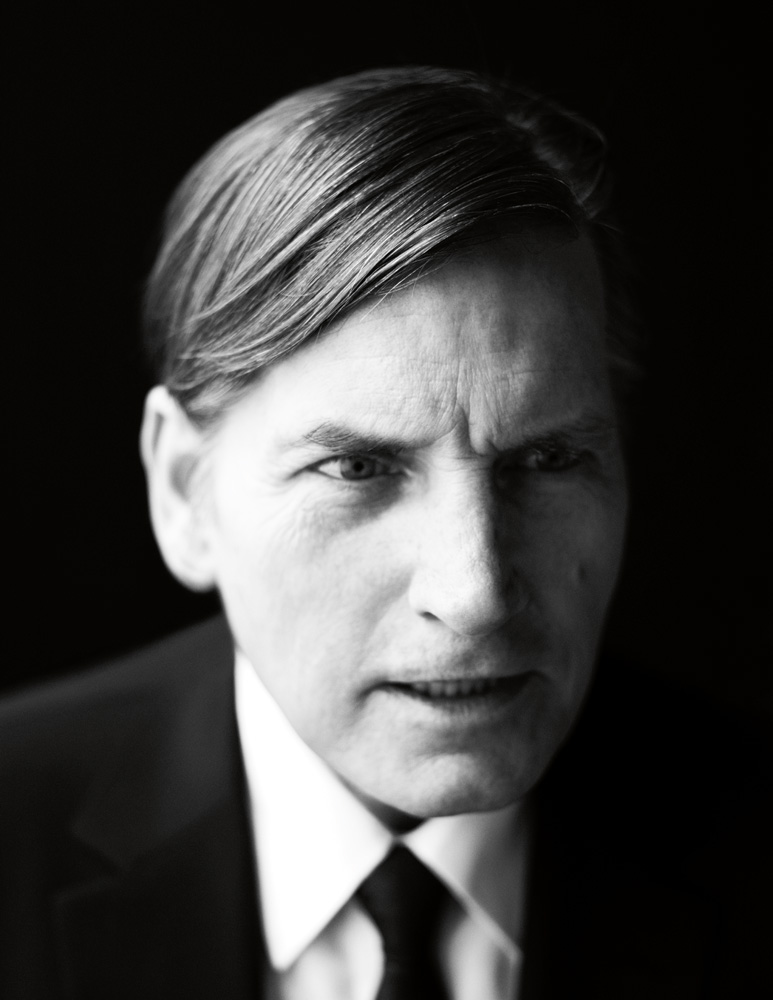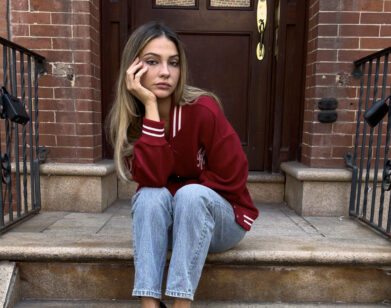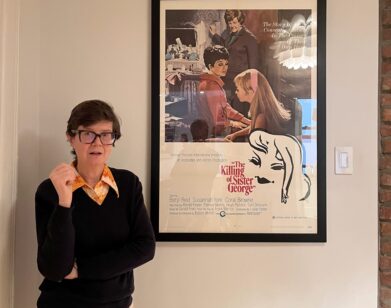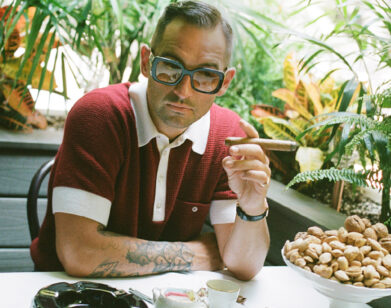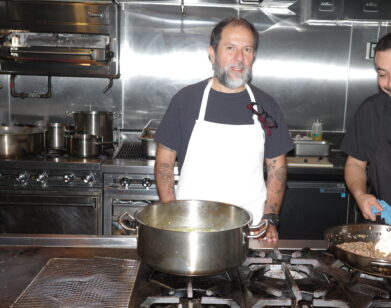Joe Dallesandro
Joe Dallesandro, a.k.a. â??Little Joe,â? was the greatest of the Warhol Superstarsâ??the only one to really break out of the film underground and have a career in cinema. You could have credited Joeâ??s success to his looks, but you couldnâ??t discount his cool attitude. And although heâ??s probably loath to admit it, Joe could also actâ??he just acted like he couldnâ??t.
Joe did his first bit in Warholâ??s The Loves of Ondine (1968), after accidentally walking onto the set and getting cast on the spot. He appeared in other Warhol films, including Lonesome Cowboys (1968). When Paul Morrissey began to direct Warholâ??s films, Joe starred in almost every oneâ??Flesh (1968), Trash (1970), Heat (1972), Flesh for Frankenstein (1973), and Andy Warholâ??s Dracula (1974).
Joe later moved to Italy, where he starred in European art and action films, working with directors such as Louis Malle, Serge Gainsbourg, and Jacques Rivette. He also led a rather wild life there. Then, after the death of his brother Bobby, who had worked for Andy Warhol as a chauffeur, Joe moved back to the U.S. in the 1980s and worked on a variety of Hollywood films and TV series, from Francis Ford Coppolaâ??s TheCotton Club (1984) to Miami Vice, even appearing in John Watersâ??s Cry-Baby (1990).
I knew Joe at Warholâ??s Factory, where, between films, heâ??d answer phones and sort of lurk menacingly in case Andy felt insecure. He was a hip but quiet guy with a twinkle in his eye. I always thought Joe had it together on an inscrutable, deep level. He was definitely mysterious. And he had obviously been around. In Flesh, he played a male hustler, and Lou Reed was talking about Joe when he sang â??Little Joe never once gave it away/Everybody had to pay and pay . . .â? But if Joe was ever really a hustler, he hustled well enough to make it as a movie star who, according to John Waters, â??forever changed male sexuality in cinema.â?
I always felt a connection to Joe. We were two Warhol scenesters who liked girls. Also, he filled the jeans on the outside of The Rolling Stonesâ?? Sticky Fingers album, while I filled the briefs insideâ??our secret connection. Today I canâ??t watch Josh Holloway, who plays Sawyer on the hit TV show Lost, without thinking he got his sexy act from Joe. Joe was a hunk, but a profoundly cool and utterly ambiguous hunk, who could be sweet, mean, blasé, threateningâ??whatever the moment called for. He didnâ??t care who loved him, young or old, male or female. He didnâ??t judge people. He was a creature of the 21st century, arrived early.
Now Joe is the subject of Little Joe, a wonderful documentary produced by his adopted daughter, Vedra Mehagian Dallesandro, and directed by Nicole Haeusser, which tells Joeâ??s story, from juvenile delinquent to Warhol superstar to European action hunk to junkie to Hollywoodcharacter actor to charming grandpa living in Hollywood and available for the right part. The film, which was the surprise hit of the Berlin Film Festival, really captures Joe with all his low-key charm. He may have started out as a wild creature, but today Joe is a kind of casual philosopher who really gets it. Joe has often played the wise guy, but here he is a literal wise guy. Hereâ??s a bit from a monologue toward the end of the film: â??I think it was because I didnâ??t have major hang-ups about my body when I was young, and I was so casual about nudity onscreen, that people got caught up looking at the surface. I know what it means to be judged on appearances. Iâ??m a lot smarter than I appear to be. People would tell me I was beautiful, but I never knew what to do with that information. It didnâ??t register.
I never really thought of myself as a good-looking man. Iâ??m short, Iâ??m stockyâ??I donâ??t know where good looks come in. I know beauty when I see it. All I can say is that I had a few good photographs taken where I look better than I do in real life. Beauty is fun. It has a place. But donâ??t mistake it for self-worth. If you have to be beautiful, do beautiful things for someone other than yourself.â? GLENN Oâ??BRIEN: Hey, Joe.
JOE DALLESANDRO: Hey, Glenn. How you doing?
Oâ??BRIEN: Iâ??m pretty good.
DALLESANDRO: Good, good.
Oâ??BRIEN: I loved your film.
DALLESANDRO: Oh, you got to see it?
Oâ??BRIEN: You know, people always talk about a film being â??a feel-good picture,â? but I really felt this was one of those.
DALLESANDRO: I think Iâ??m kind of a positive guy.
Oâ??BRIEN: Thatâ??s the way you come off. Even though you go through a lot, you handle it with poise.
DALLESANDRO: I think so. [laughs]
Oâ??BRIEN: Iâ??ve known you for a long time, but thereâ??s a lot of stuff in there that really surprised me. I didnâ??t realize how many films youâ??ve made. Youâ??ve made about 50â??which is a lot for somebody who canâ??t act.
DALLESANDRO: Thatâ??s for sure. [both laugh] Iâ??ve been fooling â??em for years. But I have a good time with it, every time. What fans I have, they appreciate me, and I kinda like that. I mean, I got a really great reception in Berlin.
Oâ??BRIEN: Um, I was kidding about the acting.
DALLESANDRO: I know, I know.
Oâ??BRIEN: Youâ??re the kind of actor who, because you donâ??t say a lot, people kind of project . . .
DALLESANDRO: Well, you know, Iâ??ve had many different images from my Warhol days, with the underground movies thereâ??people thought everything they saw me do in those was my real life. And then there were my European days, where I did my Italian shoot-â??em-ups and stuff. Not Westerns, but these kinds of young-kid gangster movies. That was another image. Neither one was really me.
Oâ??BRIEN: So this documentary about your life . . .
DALLESANDRO: We finished it for the Berlin festival.
Oâ??BRIEN: And then whatâ??s going to happen with it?
DALLESANDRO: Weâ??ve got a couple more festivals weâ??re gonna do. Weâ??ll probably do more than a couple. I know weâ??re gonna go up to Seattle. Thatâ??s the next step. Then San Francisco. Oâ??BRIEN: How did this documentary come about?
DALLESANDRO: Well, it was my daughter Vedraâ??s idea. Because she had read something that I had written . . . These people had asked me to write something for the younger people about beauty. And what I wrote really impressed my daughter, and we got together, and she said, â??Letâ??s tell your story, or at least the part that people want to hear about.â? So we did. I wanted to do it as inexpensively as possibleâ??you know, just pick up a camera and shoot it, with me telling stories. Nicole [Haeusser] did a fine job of making sense of the stories I was telling, and putting them together, because Iâ??d start a story and then Iâ??d finish it maybe the next day.
Oâ??BRIEN: How did you hook up with Nicole?
DALLESANDRO: Vedra found her. Actually they made another film together. So they worked together, and Vedra brought her in to meet me, and I thought it was great.
Oâ??BRIEN: The toughest thing must have been chasing down all that footage from those obscure European films, right?
DALLESANDRO: Yeah, Vedra did all of that. I think I have them all on video, so I had a lot of the stuff already. And then there was the guy who was a neighbor in New York City who lived across the street and had shot this thing of me and Paul [Morrissey] out on a stoop on Sixth Street, and we got to use that. I met him in Texas, I was there doing a Q&A for Je Tâ??aime [1976]. They wanted me to come out there because there were a lot of fans. And so I went, and the person who headed up this show said, â??I got this footage of you that I shot many years ago on Super 8 out my window.â? So he sent us his footage, and we put it in the film. I thought it was pretty cool.
Oâ??BRIEN: Have you been in touch with Paul Morrissey over the last 10 years or so?
DALLESANDRO: Me and Paul have stayed close. Paul still treats me like, you know . . . [laughs] like the person he met 30 years ago. Thatâ??s pretty cool. And the fact that Iâ??m 60 doesnâ??t seem to enter into anything.
there were questions. â??Do you think Joe could ever do this if we set up a meeting?â? And Paulâ??s remark was, â??I donâ??t think Joe can do a script.â? And Andyâ??s remark was, â??I think he does drugs.â?Joe Dallesandro
Oâ??BRIEN: Well, weâ??re about the same age, but Paul seemed like another generation. I donâ??t know how much older he is.
DALLESANDRO: I know. Well, heâ??s 10 years older than both of us, you know. Heâ??s in his seventies, and he turned into a grouchy old man. But thatâ??s okay. [laughs]
Oâ??BRIEN: Well, he was pretty grouchy as a young man. [both laugh]
DALLESANDRO: He was grouchy back then, too. But Iâ??ve pretty much stayed the same guy you met years and years ago. I donâ??t change. Just get older.
Oâ??BRIEN: What did you make of Paul? I mean, the contradiction of making these films about all the things he was really always griping aboutâ??drugs and freaks and drag queens. Paul was always at the Factory saying, â??Get that drug trash out of here.â? And then heâ??s directing you shooting up.
DALLESANDRO: Iâ??m sure it was weird for him, but he felt it was a necessary part of the story he wanted to show. I remember him saying once that he was tired of films like Easy Rider [1969], you know, glamorizing smoking pot or drugs. He wanted to show drugs for what they really were. I mean, the biggest hope a drug addict could have was to get on welfare, you know? So I think he made his little points in his films.
Oâ??BRIEN: Was Trash all Paulâ??s concept?
DALLESANDRO: It was all his idea, yeah. Original idea by Paul Morrissey. Most of the work we did together was an original idea of Paul Morrisseyâ??s. He based it on and around some truths about me, so they seemed realistic, but the fact that my life has some similarities has nothing to do with the films themselves. They werenâ??t documents of my life.
Oâ??BRIEN: Yeah, but was Paul saying, â??Okay, Joe, shoot up nowâ??
DALLESANDRO: [laughs] Who can remember? It was a long time ago. I just remember we used one of Brigid Polkâ??s old poking needles.
Oâ??BRIEN: Oh, thatâ??s funny.
DALLESANDRO: Yeah, and it was all burnt up and fucked up. [laughs] We just cleaned it real well. It was like shoving a nail into my arm, but I thought the more hideous it was, the better. The humor came from having the drag queen Holly [Woodlawn]. She made herself a star from that, you knowâ??for what little it was worth. You know, none of these people were able to continue this into a career, which I managed to do. Something came from doing the Warhol films for me . . . It was my school. Oâ??BRIEN: But after you went and did Frankenstein and Dracula with Paul and Andy in Europe, how did you then make the break from them? How did you make that first film without them? Did you get an agent?
DALLESANDRO: No. I had two films signed almost before Iâ??d finished Frankenstein and Dracula. So it was Pasquale Squitieri. He wanted to make a movie with me, but Vittorio Salerno came along first with this movie with Andréa Ferréol that I so much wanted to do because of her. Iâ??d seen her in this other movie Le Grande Bouffe [1973], and I had to do this movie with her because I thought she was fantastic. To play a fascist in my first Italian film was not the coolest way to start off a career in Italy. But I did it, and the next one I did was a young-guy gangster-type thing, which was fun.
Oâ??BRIEN: Did you know anything about your familyâ??s roots in Italy?
DALLESANDRO: Yeah. Iâ??m Italian on my fatherâ??s sideâ??he was Sicilian, and they were from a little town outside of Palermo called Trapani.
Oâ??BRIEN: Oh, I know Trapani. They make a nice sea salt.
DALLESANDRO: Yeah, itâ??s not far from Palermo. I never made a purposeful trip down there to go see Trapani. I just happened to get down to that area and we passed through it.
Oâ??BRIEN: Did you learn how to speak Italian?
DALLESANDRO: Yeah, but just basics. I found that most of my Italian friends wanted to learn to speak English, and so they spoke English around me.
Oâ??BRIEN: I read somewhere that you had been up for the part of Michael Corleone [in The Godfather].
DALLESANDRO: Mmm . . . yeah, there was talk, but that was all. There were no meetings or anything.
Oâ??BRIEN: Wasnâ??t it your Warhol reputation that did you in?
DALLESANDRO: Well, there were questions. â??Do you think Joe could ever do this if we set up a meeting?â? And Paulâ??s remark was, â??I donâ??t think Joe can do a script.â? And Andyâ??s remark was, â??I think he does drugs.â?
Oâ??BRIEN: Do you think Andy said that just because he was trying to hang on to you?
DALLESANDRO: No. I think it was said because thatâ??s what he thought. Andy didnâ??t usually say things unless he was making a joke. But that doesnâ??t sound like he was making a joke.
Oâ??BRIEN: Well, the joke was on you.
DALLESANDRO: I know that Andy was afraid of me for years, and thatâ??s why I basically was up there at the Factoryâ??to scare people away.
Oâ??BRIEN: I think Andy was afraid of everybody.
DALLESANDRO: I mean, my brother worked as his chauffeur for many years, and Andy wasnâ??t afraid of him. My brother and Andy talked for hours. And when my brother would come home and tell me all these long conversations, I was in disbelief because, you know, me and Andy never said more than three or four words together.
Oâ??BRIEN: Well, Bobby Dallesandro was kind of a chatterbox. He talked a lot, so he did a lot of the work. I think Andy was afraid of people who didnâ??t say much. So, out of all the films youâ??ve made, which one do you think is closest to your own character?DALLESANDRO: You mean of the Warhol films?
Oâ??BRIEN: No, I mean of everything.
DALLESANDRO: Of everything? [laughs] No, there just is nothing that represents me. They all give me a chance to play somebody else. My life was very different.
Oâ??BRIEN: You havenâ??t lived in New York for a long time. How did you adapt to being a Californian?
DALLESANDRO: Real well, because I was born in Floridaâ??and I never was one to deal with the cold very well. When I was younger, it didnâ??t faze me, but as I got older, it wasnâ??t something I was ready to go back to after my stay in Europe. In Europe, I did real well, made lots of money, and I was able to go away for the cold months to some resort area. I never stayed in Rome when it got cold. Iâ??d go somewhere else.
Oâ??BRIEN: So how come youâ??re not living in Europe now? Because of your kids?
DALLESANDRO: Because of deaths that happened in my life. You know, being that far away just seemed absurd. It just seemed Iâ??d come back speaking baby English, having lived in Europe, because youâ??re trying to make people understand you. People thought I was an idiot when I first came back from Europe after 10 years, because I had a funny way of speaking English. Anyway, Iâ??ve been home a long time now, and I still have funny ways of speaking English.
Oâ??BRIEN: Are you a grandpa now?
DALLESANDRO: Four times over or something.
Oâ??BRIEN: When you were working at the Factory, the baby you had then . . .
DALLESANDRO: That was Joe Jr.
Oâ??BRIEN: Heâ??s got to be 35 or something, right?
DALLESANDRO: Close to 40.
Oâ??BRIEN: Wow.
DALLESANDRO: Yeah, and Mikeyâ??theyâ??re both in their forties. Joe Jr. just had a child, a little girl. And Mikey has a couple of kids with his wife, in Brooklyn. Youâ??ll see a picture of Joeâ??s child on my MySpace page.
Oâ??BRIEN: Oh, yeah?
DALLESANDRO: Yeah. Heâ??s the third picture on my friends. MySpace gives me a chance to interact with my fans and talk with themâ??and make a lot of acquaintances, new people, new friends in my life, or people interested in contacting me.
Oâ??BRIEN: Somebody was interviewing me about the Factory recently, and I was discussing
security there, and how even after Andy got shot, there wasnâ??t muchâ??I guess they put up a double door. But I remember one Friday I went out to cash my paycheck, an when I came back everybody was all shook up because somebody had stuck up the place.
DALLESANDRO: Or tried to stick up the place.
Oâ??BRIEN: And they held a gun on Joe Jr.DALLESANDRO: Yeah, and I hid Andy in the back room. I was the only one that offered up some bucks to them. I said, â??You better leave now because the police are coming. Andyâ??s calling the cops.â? So they left. Just a couple of junkies with a couple of small guns. One was a .22, and one was a Derringer, so they werenâ??t gonna do too much damage there.
Oâ??BRIEN: So after that, you left the Factory and you had made those last two Warhol horror films. I guess Frankenstein was the only movie that ever really made a lot of moneyâ??although not for Andy and Paul. They sold it cheap and then it grossed a lot. Did you ever have any contact with Andy after that?
DALLESANDRO: No. One time I needed some money to do some demo work and I think Andy sent me 50 bucks. [laughs] Funny guy. But I had no contact with him.
Oâ??BRIEN: Are you doing any acting these days?
DALLESANDRO: I kind of retired from it for a while. I may opt to do some more work in the very near future, but itâ??s only gonna be with people who know me and want to work with me. Iâ??m not gonna go out and hunt down jobs.
Oâ??BRIEN: Well, you look good.
DALLESANDRO: I feel good.
Oâ??BRIEN: How did you survive all that? You went through a lot.
DALLESANDRO: Nothing that I couldnâ??t handle, I guess. You know, Iâ??ve had a pretty nice life. I tell people that anybodyâ??d give their left nut to have the life Iâ??ve had.
Oâ??BRIEN: So what do you do with yourself now?
DALLESANDRO: I manage a building that I think is pretty cool. I call it The Chelsea West, because I have 90 units and a lot of pretty cool peopleâ??a real assortment, from professors to street performers, every type of person . . .
Oâ??BRIEN: Do you get recognized on the street?
DALLESANDRO: No, I donâ??t. I just walk a very low-profile life. But if I go out to do things around my work people, the fans still are there. I like that. Berlin was incredible.
Oâ??BRIEN: I think you might get a lot more fans after people see this film.
DALLESANDRO: Well, I donâ??t think I bad-mouth anybody.
Oâ??BRIEN: No, you come off as extremely gracious, I think.
Oâ??BRIEN: Youâ??re still pretty fit. Do you exercise?
DALLESANDRO: No, not at all. But Iâ??m thinking about it. Iâ??m thinking about losing some weight and getting in shape. But, like I said, Iâ??m 60 years old. Not much I want to conquer in life anymore. Iâ??ve had a great life, from being a Superstar to being a small star in Europe to coming back and having people still want me to do work . . .
Itâ??s been pretty nice.
Glenn Oâ??Brien is a New York Cityâ??based writer

